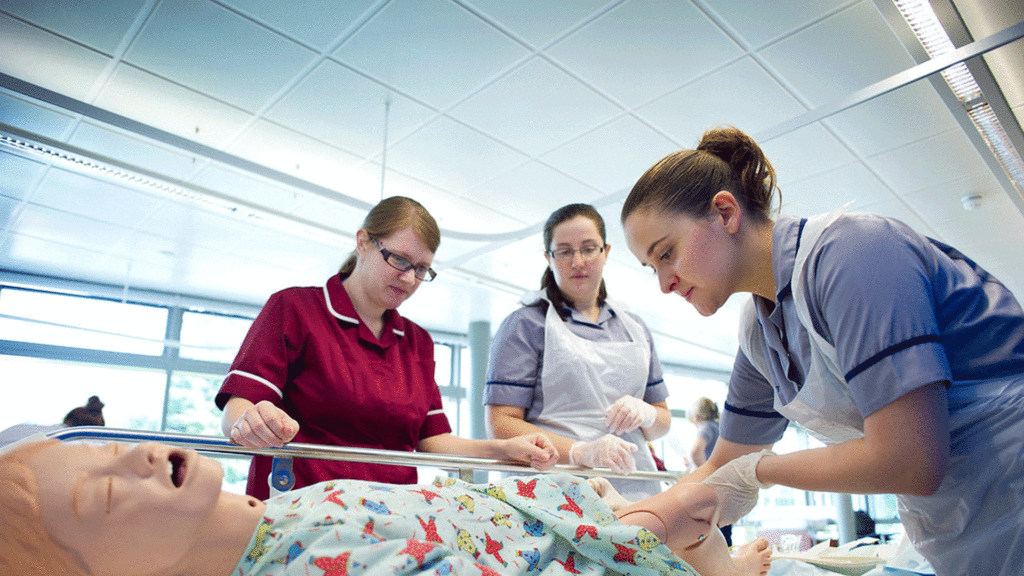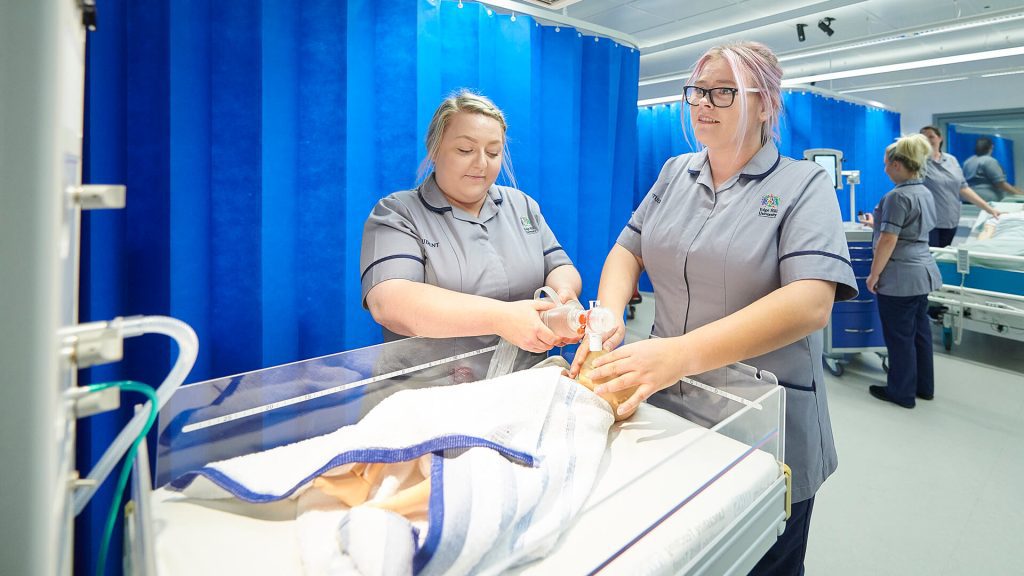Paediatric Critical Care PGCert
Expand your experience in the care of critically ill or injured children. Our PGCert in Paediatric Critical Care will be key to your professional development. Continue to practice as you enhance your paediatric clinical skills.
Overview
| Course length: | 1 year part-time |
|---|---|
| Start dates: | September 2024 September 2025 |
| Location: | Alder Hey Institute in the Park (Liverpool) |
| Subject(s): | Health and Social CareNursing |
| Faculty: | Health, Social Care and Medicine |
| Department: | Nursing and Midwifery |

Expand your experience of paediatric clinical skills such as thoracic drain removal, renal replacement therapy and critical care transport, while acquiring the underpinning theory. Our PGCert in Paediatric Critical Care, delivered at Alder Hey’s Institute in the Park, will be key to your professional development and progression to senior nursing roles in this vital area, as you continue to practice as you learn.
Key recommendations from NHS England state the importance of children being cared for within Paediatric Critical Care (PCC) by specialists in the care of critically ill children. The PGCert in Paediatric Critical Care will provide you with a solid foundation for all the major elements of contemporary Level 3 PCC, as defined by the Paediatric Critical Care Society.
You’ll receive a detailed understanding of the complex issues underpinning best practice in the delivery of contemporary care within the paediatric intensive care setting. You’ll then build on this, focusing on enhancing the expertise required to move from a position of basic effectiveness within your clinical team to a position of refined functioning within the speciality.
Our blended learning approach will provide flexibility and variety. Face to face and virtual teaching from experienced clinicians, case studies, simulation, and hands-on clinical experience of real life paediatric critical illness scenarios will enhance both your clinical skills and patient safety.
Course features
-
Professional accreditation
-
Work placement opportunity
What you'll study
This course consists of two modules which are studied over the course of one year. The aim of these modules is to enhance your knowledge and provide you with the tools to become a more experienced practitioner within your chosen field. You will cover areas such as paediatric respiratory disease, congenital heart disease, nutrition in the critically ill child and surgical and neonatal emergencies.
How you'll study
The face-to-face delivery of this course takes place weekly on a Tuesday with lectures, clinal skills and simulation sessions, science-based practical sessions, as well as structured clinical placement hours in your own employment setting. There is also the availability for tutorials with the faculty outside of sessions. There are learning resources to prepare for each week on Blackboard, including recommended contemporary literature and quizzes to test knowledge.
How you'll be assessed
A two-part assessment strategy has been devised for this course, with the assessment points clearly identified at the end of each module. The assessment tasks reflect a range of methods intending to reflect your differing strengths and capabilities. These include oral case presentations in practice, written assignments and the completion of a clinical competencies portfolio.
You will also take part in various clinical simulations to assist you with completing your clinical competencies, such as advanced airway support and mechanical ventilation, complications associated with post-operation paediatric cardiac surgery and emergency management.
Who will be teaching you
You will be taught by an educational faculty whose expertise and knowledge are closely matched to the content of the course. The team includes experienced academics, advanced clinical practitioners, and senior registered healthcare professionals from a variety of backgrounds. Teaching is informed by research, publication and consultancy, and all senior members of the team have a higher education teaching qualification and/or doctorate.
Entry criteria
Entry requirements
To join this course, you should fulfil the following criteria:
- BSc (Hons) in a nursing or health related subject (normally 2:2 minimum classification).
- Registered Child Nurse, or equivalent, with the Nursing and Midwifery Council OR
- Registered Adult Nurse with the Nursing and Midwifery Council and a minimum of 2 years working in paediatrics.
- Registered Allied Health Professional with an appropriate professional body, with a minimum of working 2 years in paediatrics. Applications from registered healthcare professionals (non-nursing) will be considered on a case by case basis.
- Current employment within a Paediatric Critical Care Unit Level 2/3 care, with a minimum of 12 months experience (18 months for new graduate)
- Successful completion of Paediatric Life Support (PLS) within the last 12 months.
You must provide evidence that your application is supported by your Line Manager and/or Training and Development Lead in terms of funding.
An interview will form part of the application process.
If you do not have an honours degree, but otherwise fulfil the entry criteria above, you may be admitted to the programme if you can demonstrate your ability to succeed at Level 7 study by:
- Being a practitioner, in an appropriate clinical area, who demonstrates extensive practice experience within a Paediatric Critical Care setting (as captured in applicants revalidation portfolio or other similar professional portfolio).
- Demonstrating, through their professional portfolio, a comprehensive knowledge of the discipline and an in-depth awareness of current issues, equivalent to that of degree level study, relating to either a health or social care setting.
- Evidencing, at interview, (1) skills of critical analysis and evaluation through discussion or from previous academic study and (2) your ability to learn in a flexible manner, utilising autonomy, and self-direction.
Disclosure and Barring Service (DBS) requirements
Work-based learning in your place of work is a requirement of the course, therefore you must have a reference from your employer which confirms a declaration of good character and evidence of a current enhanced DBS.
English language requirements
International students require IELTS 6.5, with a score no lower than 6.0 in each individual component, or an equivalent English language qualification.
If your current level of English is half a band, one band, or one-and-a-half bands lower, either overall or in one or two elements, you may want to consider our Pre-Sessional English course.
How to apply
There is an online application process for this course.
Should you accept an offer of a place to study with us and formally enrol as a student, you will be subject to the provisions of the regulations, rules, codes, conditions and policies which apply to our students. These are available at www.edgehill.ac.uk/studentterms.
There’s plenty of opportunities to come take a look around campus. Attend one of our open days to see what life at Edge Hill University is all about.
Book an open day
Where you'll study
Finance
Tuition fees
UK Part-Time
£50 per credit
for 60 credits
EU/EEA and Swiss students who have settled or pre-settled status under the EU Settlement Scheme, as well as Irish nationals, may be eligible for the UK tuition fee rate.
Your future career
The PGCert in Paediatric Critical Care is designed to ensure you have the expert knowledge and clinical competencies required for a career in this area. The programme provides a multi-faceted approach to the development of knowledge and skills required to care for higher acuity patients in Paediatric Critical Care and this can help you progress to more senior roles such as band 6 nurse, clinical research, advanced clinical practice, senior management, and clinical education. The programme would be transferable to other Paediatric Critical Care Units in the UK.










